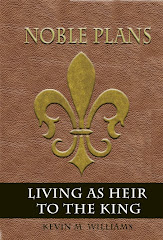
From Noble Plans: Chapter Two
The very notion of everyday people owning anything gold would have been inconceivable not too long ago. In a season where home ownership is an American ideal, we forget that in mother-Europe, landowners were few and serfs or peasants who worked the land were esteemed the disposable and renewable resource. Property, gold, silver, rubies, and diamonds, the very symbols of royalty have, like so many other things in our modern culture, lost much of their intrinsic value by virtue of becoming commonplace—so commonplace that TV networks run round-the-clock sales.
Regretfully, commonness has also overcome holiness. It has been diluted to the point that it bears little semblance to what it once did . . . .
. . . There is a constant call on God’s people for holiness. That does not mean worship only or service only, though those are crucial and worthy aspects of the life of the faithful. It means exactly what it meant in the age of the Bible: the consecration and separation of a Holy Bride for a Holy Bridegroom, the King of all the earth. Our modern distance from regal devices and sovereign rule do not give us leave to do as they did in the days before God established His temple in Jerusalem. “In those days there was no king in Israel; every man did what was right in his own eyes” (Judges 17:6). Proverbs tells us, “Every man’s way is right in his own eyes, But the LORD weighs the hearts (Prov 21:2, italics mine).
How would you be, if he, that is the top of judgment,
should but judge you as you are?
O, think on that;
and mercy then will breathe within your lips,
like man new made.
–William Shakespeare
 |
"A noble man devises noble plans; and by noble plans he stands"
[Photo: St. Edward's Crown]





No comments:
Post a Comment